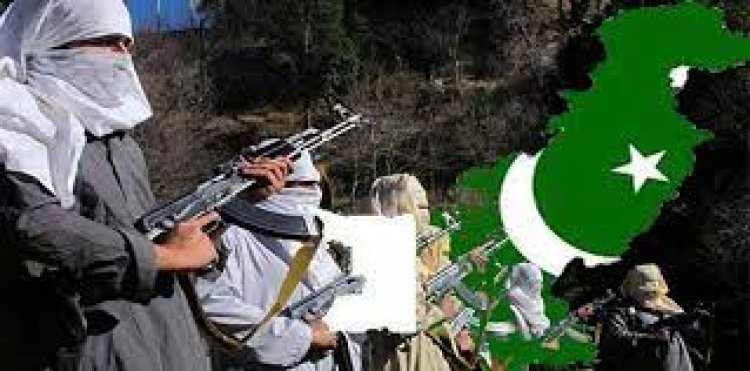Karachi: The Capital of Crime and Serial Violence and the Breeding Ground of International Terrorism
This blog post investigates the mysterious assassinations of major terror operatives in Karachi, offering an analytical dive into possible theories and patterns behind these killings.

Analysis and Theories on Recent Assassinations: A More In-Depth Look at Patterns and Triggers
Uncovering the Mysterious Cause of Karachi Targeted Killings
Karachi, Pakistan's largest metropolis and a hub of crime and bloodshed has become synonymous with terrorism. But even terrorists are not immune to the toxic climate that prevails in this metropolis. A case in point is the inexplicable murder of well-known Lashkar-e-Taiba (LeT) activist Maulana Zulfiqar Ali Rahman. Karachi police initially suspected an internal gang feud, but when many days passed without any evidence, that suspicion was abandoned. The murder has confounded Pakistan's security system, particularly the rogue Pakistani intelligence agency ISI, which is trying to identify the perpetrators. Some ISI personnel link the death to India, though without blaming Indian intelligence. The ISI sees a pattern behind the current spate of similar deaths and suspects that these targeted killings are due to a trigger.
Several key LeT and ISI operatives have been murdered in Karachi, though the killers are still unknown. For example, the architect of the Dangri terrorist attack in India, Muhammad Riaz (aka Abu Kasim Kashmiri), was shot dead in a mosque. Molana Hafiz Kari Kuram Shahzad, another LeT operative, was also assassinated. In May, an ISI agent named Paramjit Singh Panwar, who was wanted in India for terrorism, was assassinated. He was murdered while on a morning walk near his home. In addition, the former head of the Pakistani terrorist group Al Bad was murdered outside his house, and Imtiaz Alam (alias Bashir Ahmed P), a terrorist wanted by India, was also murdered outside his house. In addition, a Jaish-e-Mohammed terrorist who hijacked an Indian Airlines flight was killed in Karachi. In all these cases, the names of the killers remain unknown.
The pattern that emerges in these targeted assassinations casts doubt on their motives. Is there a war between Pakistani terrorists, or are these deaths the result of rivalries between gangs? Whatever the cause, one thing is clear: These are not random acts of violence. There is clearly a triggering mechanism that has led to this wave of targeted attacks, and it is Pakistan's responsibility to identify those triggers.
Terrorism has always plagued Pakistan, and Karachi is a hotbed of terrorist activity. The city is a hotbed for many terrorist organizations, most notably the Lashkar-e-Taiba (LeT), which has a strong presence there. The LeT, also known as the "Army of the Pure," emerged in the late 1980s as a militant organization primarily dedicated to Muslim independence in Kashmir. The LeT's goals have evolved over time to include larger regional aspirations and closer ties to global jihadist movements. These goals have led to bloodshed not only in Indian-administered Kashmir but also in other regions of India and overseas, with Karachi being the group's headquarters.
Given the existence of the LeT and other terrorist organizations in Karachi, it is predictable that targeted assassinations will occur within their ranks. However, the level of secrecy surrounding these assassinations is remarkable. The assassinations are carried out with precision, leaving no clues as to the killers or their motives. This raises the question of who is responsible for these targeted assassinations and what their ultimate purpose is.
There is a perception circulating among Karachi police and the ISI that the deaths are the result of a power struggle within the LeT. Internal divisions and power struggles between extremist organizations are not uncommon and often culminate in violence. The LeT leadership may be aiming to consolidate its control or eliminate potential challengers who threaten its rule. According to this argument, the attacks are not directly related to the actions of the Pakistani state or foreign intelligence services but rather reflect internal dynamics within the LeT.
Another idea holds that the killings are the result of rivalries between gangs within Karachi's criminal underworld. The city has long been known for its high crime rate, with multiple crime syndicates vying for control of lucrative illicit businesses such as drug trafficking, extortion, and organised crime. The deaths may be the result of territorial disputes between different criminal organisations, in which LeT members died in the crossfire.
While these hypotheses provide probable reasons for targeted killings, the fact that there is a pattern in the recent attacks’ casts doubt on their veracity. The tactics used in the attacks and the categories of targets chosen are comparable. These similarities suggest that there may be a common cause or trigger for the murders.
One possible trigger could be the increased vigilance and counterterrorism operations of Pakistan's security services. It is likely that the increased security measures have forced terrorist organisations to develop new techniques and tactics to avoid detection. This change in strategy may have led to internal tensions and disagreements within these organisations that resulted in the targeted assassinations. The assassination of Maulana Zulfiqar Ali Rahman, a well-known LeT activist, can be taken as evidence of such an internal struggle.
Another likely reason is the strained relations between India and Pakistan and the ongoing tensions between the two countries. Pakistan has long been accused of harbouring and supporting terrorist organisations such as the LeT and Jaish-e-Mohammed that carry out attacks in India. The recent targeted killings in Karachi could be interpreted as a response or retaliation for these activities. The mysterious assassins could be trying to undermine Pakistani support for these organisations, or they could be sending a message to both Pakistan and India about the implications of their activities.
The reason for these targeted attacks remains a mystery, and Pakistani security agencies must delve deeper into the issue to resolve it. Pakistan desperately needs to get a handle on this problem because it poses a significant threat to the country's security and stability. Terrorist killings not only cause internal divisions and strife but also hinder Pakistan's efforts to fight terrorism and improve its standing in the world.
The targeted killings of top terrorists in Karachi have confounded Pakistan's security system and the ISI. Investigations into these killings have produced no clear evidence or leads, so the identity and motives of the assassins remain unknown. Karachi's reputation as a hotbed for terrorist groups and the high crime rate in the city further complicate matters. According to many interpretations, the deaths could be the result of internal power struggles within the LeT or conflicts between gangs within Karachi's criminal underworld. However, the fact that there is a pattern in the recent attacks challenges these arguments. Increased counterterrorism operations by Pakistani security services and strained relations between India and Pakistan could be factors in the targeted attacks. Further investigation is needed to solve the mystery behind these targeted killings and to address the underlying issues plaguing the security situation in Karachi.
Meanwhile…
You can just join our account management program and relax. We will make at least 1% profit for you on your account – Check out how by clicking on the link below.
Have fun trading!
Have a great journey, and may you catch some big waves on your way to prosperity!
To see this for real, click here.
https://www.myfxbook.com/members/SankarGanesan/tradefxp-trend-antitrend-day-trading/10404725
To read why you should be with us, click here
To open an account, click here.
To see our regulation certificate: click here.
To see our news with the IFMRRC: click here.
For claims, click here.
For the main site: click here.
For blogs and articles: click here.
Main Website: www.tradefxp.com



 admin
admin 










